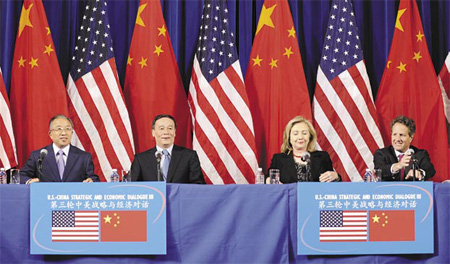Top News
Nations address economic concerns
Updated: 2011-05-11 11:25
By Li Xing (China Daily)
|
Vice-Premier Wang Qishan (second from left), State Councilor Dai Bingguo (first from left), US Secretary of State Hillary Clinton (second from right) and Treasury Secretary Tim Geithner at a news conference in Washington. Zhang Jun / Xinhua |
WASHINGTON - China and the United States agreed to expand and enhance their economic cooperation into an extensive range of sectors to ensure strong, sustainable and balanced growth during the Strategic and Economic Dialogue (S&ED).
The details of the broadened economic relationship were sealed in the Comprehensive Framework for Promoting Strong, Sustainable, and Balanced Growth and Economic Cooperation, signed on Tuesday by Chinese Vice-Premier Wang Qishan and US Treasury Secretary Timothy Geithner.
Meanwhile, the two countries each pledged to take actions to address the other's concerns in their economic relations as the top government officials from both countries concluded the Economic Track of the third round of the annual dialogue on Tuesday.
Following China's repeated request for the US to ease its high-tech exports to China, the US committed "to accord China fair treatment in a reform of its export control regime and relax high-tech exports control toward China," Wang said during the joint news conference with other three co-chairs of the S&ED, US Secretary of State Hillary Clinton, Geithner and Chinese State Councilor Dai Bingguo.
"The United States will continue discussions, including technical discussions, on the export control status of designated parts, components, and other items of interest," Zhu Guangyao, vice-finance minister, explained to the media following the joint press conference, quoting from the Joint China-US Economic Track Fact Sheet released by the US Treasury Department.
The US also agreed to consult through the Sino-US Joint Commission on Commerce and Trade to speed up the process for the US to recognize China's market economy status, Wang said.
Meanwhile, China promised not to link its innovation policies to government procurement, Zhu said, adding "China will act upon its promise".
As for protection of intellectual property rights, Zhu said IPR protection is in China's own interest and a prerequisite for China to achieve its goal of building an innovative society.
"The two countries share the common interest in enhancing actions for IPR protection and strengthening the inspection of government software and its use," Zhu said, adding that efforts are also needed to enforce the laws and regulations.
China's commitment to "making long-term improvements in its high-level protection of IP rights and enforcement regime will help protect US innovators as well as Chinese innovators in all industries, not just in software," Geithner said.
"We are seeing very promising shifts in the direction of Chinese economic policy," Geithner said during the news conference, highlighting the fact that the renminbi has risen against the dollar by more than 5 percent since last June.
He said the Chinese currency appreciated at annual rate of about 10 percent "when you take into account the fact that Chinese inflation is significantly faster than that in the US".
"China and the US agree to the general direction in China's currency reform, but the two countries diverge on the pace of the reforms," Zhu said.
China and the US have maintained their open communication on monetary policies, not only about the yuan but also over the US dollar and its stability as the world's main reserve currency, Zhu said.
The US side has promised to keep vigilance over the dollar's excessive fluctuations, while the Chinese side pledged to maintain the flexibility of the yuan, Zhu said.
"The consensus we've reached is balanced," he said.
Both countries pledge to take additional measures to promote free trade and investment, recognizing it helps spur economic growth, creates jobs and promotes innovation and prosperity.
The two countries have achieved "a host of win-win outcomes", Wang said in the joint news conference on Tuesday.
Wang especially highlighted the consensus of expanding cooperation of railways, power grids and other infrastructure programs, as well as clean energy and green technologies.
Wang said the two countries agreed also to enhance "information-sharing and cooperation" regarding the regulation of systemically important financial institutions, shadow banking, business, credit rating agencies, the reform of remunerations policies and combating illegal financing, to jointly advance financial reform.
The US-China Business Council (USCBC) has a positive outlook after the two-day talks.
"Outlining specific steps to remove market barriers in China's government procurement policies is one example of an outcome that is important for American companies. Eliminating the use of government-approved product lists for procurement at all levels of government will be significant, if fully implemented," said John Frisbie, USCBC president. "Not every problem got resolved, but once again, steady and focused engagement with China proves to show results."
The most important thing now is to translate pledges into actual action, Zhu said.
"It won't do if we only hear the sounds of steps upstairs but see no one come down," he said.
China Daily
Specials

Sino-US Dialogue
China and the US hold the third round of the Strategic and Economic Dialogue from May 9-10 in Washington.

V-Day parade
A military parade marking the 66th anniversary of the Soviet victory over Nazi.

Revolutionary marriage
A newlywed couple sings revolutionary songs during their marriage.
